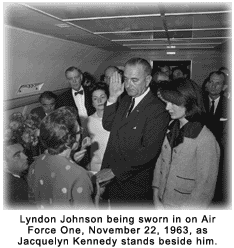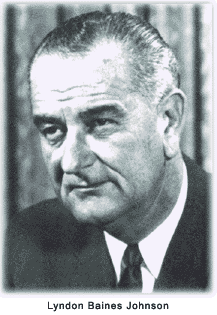Lyndon Baines Johnson (LBJ) dreamed of "A Great Society" for the American people. In his first years as president he won passage of one of the most far-reaching legislative agendas in the nation's history. Maintaining collective security, he carried on the rapidly growing struggle to restrain communist encroachment in South Vietnam.
Johnson was born on August 27, 1908, in central Texas, not far from Johnson City, which his family helped to settle. He lived the pain of rural poverty as he grew up, working his way through Southwest Texas State Teachers College (now known as Texas State University at San Marcos). He learned compassion for others when he taught poor students.
In 1937, Johnson campaigned successfully for the House of Representatives on a New Deal platform, effectively aided by his wife, the former Claudia "Lady Bird" Taylor, whom he had married in 1934.
During World War II Johnson served briefly in the Navy as a lieutenant commander, winning a Silver Star in the South Pacific. Following six terms in the House, Johnson was elected to the Senate in 1948. In 1953, he became the youngest Minority Leader in Senate history, and the following year, when the Democrats won control, Majority Leader. With canny ability, he gained passage of key Eisenhower measures.
 In the 1960 campaign, Johnson, as John F. Kennedy's running mate, was elected vice president. When Kennedy was assassinated on November 22, 1963, Johnson was sworn in as president.
In the 1960 campaign, Johnson, as John F. Kennedy's running mate, was elected vice president. When Kennedy was assassinated on November 22, 1963, Johnson was sworn in as president.
First he obtained enactment of the measures President Kennedy had been urging near the time of his death: a new civil rights bill and a tax cut. Next he urged the nation "...to build a great society, a place where the meaning of man's life matches the marvels of man's labor." In 1964, Johnson won the presidency with 61 percent of the vote and had the widest popular margin in American history — more than 15,000,000 votes.
The Great Society program became Johnson's agenda for Congress in January 1965:
Under Johnson's administration, NASA accomplished spectacular explorations of space in a program he had championed since its start. When three astronauts successfully orbited the moon in December 1968, Johnson congratulated them: "You've taken ... all of us, all over the world, into a new era. . . ."
Nevertheless, two overriding crises had been gaining momentum since 1965.
 Despite the beginning of new antipoverty and anti-discrimination programs, unrest and rioting in black ghettos troubled the nation. President Johnson steadily exerted his influence against segregation and on behalf of law and order, but there was no early solution.
Despite the beginning of new antipoverty and anti-discrimination programs, unrest and rioting in black ghettos troubled the nation. President Johnson steadily exerted his influence against segregation and on behalf of law and order, but there was no early solution.
The other crisis arose from Vietnam. Despite Johnson's efforts to end Communist aggression and achieve a settlement, fighting continued. Controversy at home over the war had become acute by the end of March 1968, when he limited the bombing of North Vietnam in order to initiate negotiations with that country. At the same time, he startled the world by withdrawing as a candidate for re-election so that he might devote his full efforts, unimpeded by politics, to the quest for peace.
When Johnson left office, peace talks were under way; he did not live to see them succeed. LBJ died suddenly of a heart attack at his Texas ranch on January 22, 1973.
For more information about President Johnson, visit The Lyndon Baines Johnson Library and Museum.